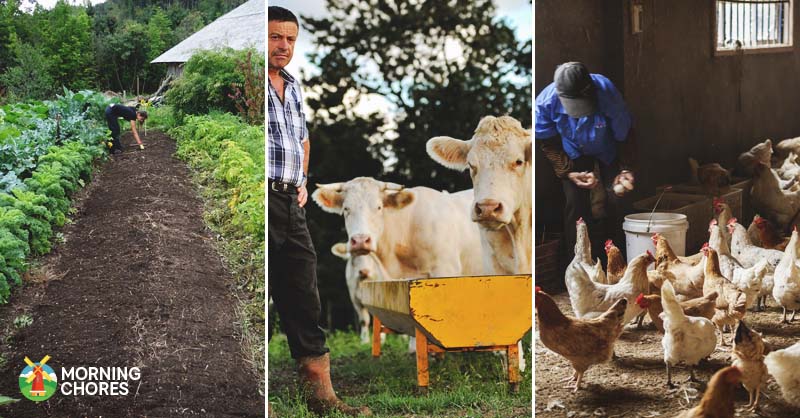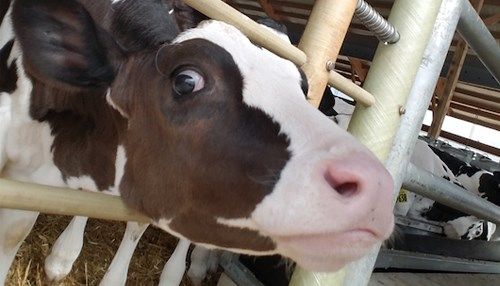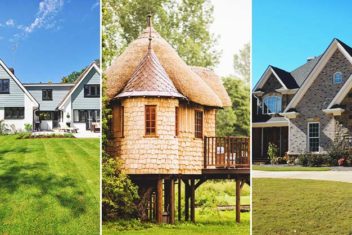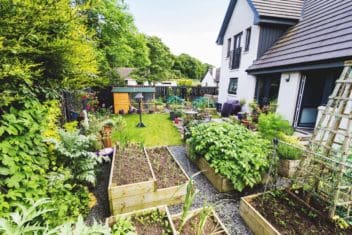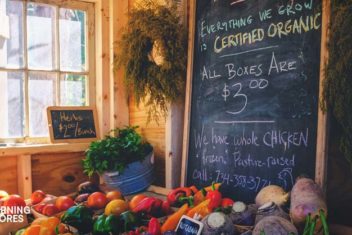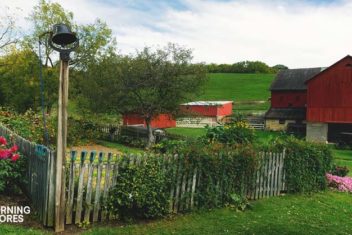Are you wondering how you can actually make homesteading a reality for you?
Maybe you follow homesteading sites on social media and think, “I’d really like to live that life, but I don’t even know where to start.”
Or worse, you put that dream back up on the shelf because you don’t think you could never achieve it. I’ve heard all of the regular excuses: I don’t have enough land, I can’t afford more land, or I don’t know anything about homesteading.
Well, I was once a city girl myself. I knew nothing about animals, and I was at absolute rock bottom financially when we decided to launch our homestead.
So I figure if my husband and I can launch our homestead dream, then a lot of other people can too! They just don’t realize it yet.
Which is why I’m going to give you a few tips from my personal experience. Here is what you need to know:
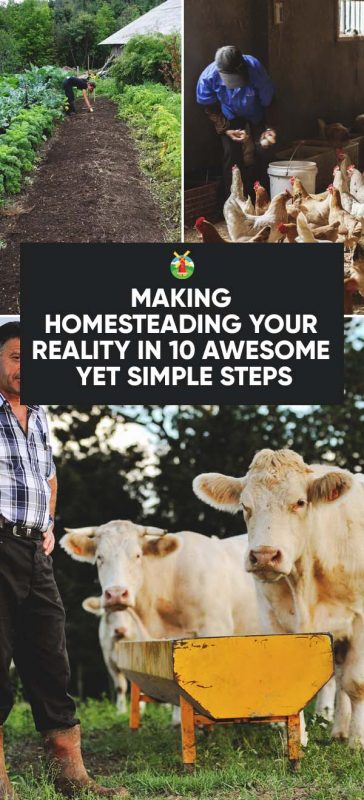
1. Do with What You Have
A lot of people automatically want to jump into a larger homestead adding more debt on top of what they already have.
Well, if you want to become a homesteader the first thing is you must slow down. You have to figure out how to homestead right where you are. If you live in an apartment, then consider doing what you can while you are there. This could be something as simple as learning to can your own food. You could always buy the food and preserve it yourself. It is healthier and could save some money too.
Or if you live in a subdivision, then see if there is a way for you to squeeze in a few laying hens. Be sure to check with your HOA first, though. If nothing else, try your hand at washing your clothes by hand, preserving your own food, and making as much of what you use as you can.
Basically, you just have to do what you can with where you are at. If you can do the small things and be happy about it, then you can try your hand at adding larger items on. For instance, you could grow a container garden.
However, when we got started we lived on 2 acres of unrestricted land. We started off by learning to can our own food.
Then we grew a small garden to grow the food we were canning. From there we added on chickens and kept progressing from there.
So you’ll have to look around at your own situation and see exactly what you can learn to do right where you are at, first. Make a list so you can visualize all you can do, and don’t be afraid to get creative. You’ll be surprised at all you can do in the situation you are currently in. Homesteading is a mindset more than anything.
But you’ll learn that as we move along.
2. Implement What You Can
Now that you’ve looked at your current situation, it is time to implement what you can do. As I just mentioned, you’ll want to make a list. Figure out which tasks you can do and in what order you’d like to begin doing them.
Then you can get to work. Food was a huge priority for us because we were really down on our luck financially, and we had mouths to feed.
So I began by realizing I could can food. I stopped grocery shopping as much as possible and began using my grocery money to go to the Farmer’s Markets or local farmers and buy food in bulk. That way I could preserve the food and get a lot more bang for my buck. This worked for me, and then I began trying a new task on top of canning my own food.
But you’ll have to see what is your number one priority so you can have a nice starting point. Realize, we all crave this lifestyle for one reason or another. Some have health issues so that they are desperate to lead a more organic life and hopefully find healing.
Others are tired of the financial pressures of the world. Then you have some that just want a slower and quieter life.
But if you’d like to have any of these needs fulfilled (or your own reason for homesteading if you don’t fall into any of the above-mentioned categories), then you have to build skills right where you are at. This lifestyle isn’t easy, but the payoff is wonderful. Just be prepared to work for your dream…starting where you are and implementing what you can do in that place.
3. It Must Function Before It Looks Good
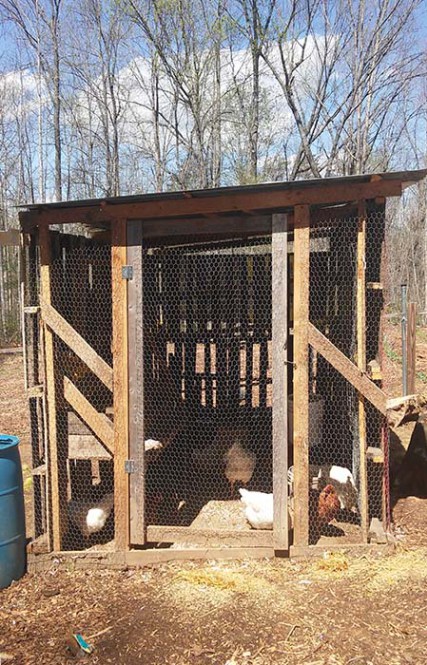
via Morning Chores
This was the thing I struggled with the most. I like to have a pretty home, but my husband told me that our place had to function before we could worry about it being pretty.
Now, I wasn’t happy in the beginning with this way of thinking, but he was right.
So I’m going to pass the same advice onto you. You have to use what you have to make the projects you are doing cost effective and functional.
For instance, our first chicken coop was practically free. It wasn’t pretty, but it was the same chicken coop we used for about 5 years until we moved to our larger homestead. It was very functional, spacious, and super cost effective as well.
Then when we moved, we still didn’t go hog wild on a coop. We built this coop for around $100.
So if you have the option of building something for practically free that will work well but won’t be as pretty as another idea that will work and be pretty too, then you better go the free route. The reason is that it goes along with a homesteading mentality. You want to be able to do as much as you can on your own and using what you already have. It creates knowledge and that is something that is invaluable.
4. Gain Some Knowledge
Speaking of knowledge, I cannot tell you how important it is to have the know-how. I’m going to get on a soapbox for just a minute. You don’t have to agree with every word I say, but I do ask that you at least take what I’m saying into consideration.
My grandparents and great-grandparents weren’t always the wealthiest of people, but they were very intelligent. They knew how to survive. It was second nature to them because it had been passed down through the generations and was put into practice on daily basis.
However, when my parents’ generation came around, something changed. It became more popular for kids to go to college, work desk jobs, and make money to pay for what they needed instead of creating it themselves.
Now, I’m not throwing off education or anything of the sort, but I will say this: when all you know is to depend upon someone else for your daily needs such as food, heat, hygiene items, a machine to wash your clothes and dishes properly, and many other daily things most people do and take for granted, then we have become ignorant.
Realize, ignorant is not the same thing as stupid. Ignorant just means that people genuinely don’t have the knowledge to do things on their own anymore. You need to gain that knowledge. This knowledge is what will keep you from pushing people over at the local Walmart when you hear a big snow storm is coming, so the panic ensues for milk and eggs before it hits.
This knowledge will be what will keep your family fed when hard financial times come, and you simply can’t afford that normal trip to the grocery store.
And this knowledge will be what will help you become a more confident person because you will know where your meat comes from (and your answer will not be a grocery shelf.) You will know the process of making butter. You will also know how to create gorgeous Christmas gifts that won’t require you to go into debt over a holiday.
So do your research, read a lot, and try new things. Even if you fail, you are gaining knowledge.
5. Set Future Goals but Remain Flexible
Once you are doing all that you can with where you are at, it is time to put your future goals down on paper. You need to think about what your end game looks like.
However, I caution you to be flexible when making these goals.
In our case, our goal looked like creating a micro-farm. We wanted to raise all we could right there on our two acres. Once we were self-sustained we thought we were finished.
Then life happened and goals changed. We realized we had taken a property purchased out of foreclosure and beautified it. It suddenly had value to it, and we could afford to move to a larger homestead because of this 5-year investment we had made in this property. Don’t get me wrong, this was a hard road to travel and a lot of blood, sweat, and tears went into that property.
But when my mother-in-law passed, we suddenly couldn’t stand to be at the end of a private dirt road with the only scenery from our front door being her old house. The whole place looked like death to us.
So we changed our goals and decided we’d like to have a larger homestead with gorgeous mountain views, big pastures, and mature fruit trees. And we found that.
Which means, you can set goals but just realize that they might change over time. Keep dreaming, keep reaching, and know that if 5 years down the road the dream has been reached, it is okay to be content right where you are, and it is also okay to pick up and start an even larger dream. Homesteading truly has no limits.
6. Budget, Budget, and Budget
This is the tough part. A lot of people think that they can’t homestead because they can’t afford the land.
Well, as mentioned, homesteading isn’t always just about the land. It is about taking what you have and learning to do as much as you can with it. When you begin doing things on your own you will soon see that you have extra money.
For us, when I began doing something as small as canning, it really saved us a lot of money. With my husband’s job, his pay is unsteady.
So he’ll often make a lot of money during the summer and make very little money over the winter. When I used some of those larger paychecks to put back food for the winter, I was no longer scraping the bottom of the barrel in the winter.
Instead, I had money left over that could go towards other things around the house or in a savings account. It made life much more balanced and easier.
So you’ll need to realize that you’ll want to make a budget. Set aside so much money to do some of the new things you want to do in your current situation. When you see more money open up, then do more new things.
Of course, if money isn’t super tight for you, then begin setting some of your paychecks aside for new things you wish to try and for long-term goals as well.
But a budget will help you know where you stand, where your money is going, and also help you to save for where you hope to go. Here are some tips for creating a homestead on a tight budget.
7. Ditch Your Debt
Most of us have debt. It is hard to live in our modern society and not have a credit card or two. I once thought this was normal until I developed the homesteading mentality.
Now, I realize, I can do things differently. I don’t have to be in debt. It takes lots of hard work to get out of debt and to stay out of it too.
But with some intentional planning and some willpower, it can be done. Here are my tips for helping you to ditch your debt.
So realize, if you are a shopper (and especially a shopper who shops on credit), you’ll have to change this habit. You will want to live within your means because the less money you owe someone else is more money that can be invested in your dream and also will make you more self-sufficient which is the ultimate goal of most homesteaders.
8. Maintain What You Have
A lot of people think once they are doing what they can with their current situation, have future goals, are saving for those goals, and are out of debt or at least working at it, then they are good for taking the big plunge into a huge homestead.
Well, let me tell you from someone who once thought like that too, you need to focus on maintaining what you have. The reason being is if you struggle to keep up with where you are at, how in the world are you going to keep up with more?
In short, you won’t. You’ll get frazzled and burn out very quickly.
So you need to get a maintenance plan for your current situation. For instance, even if you live in the city in a small apartment trying to wash your clothes by hand, preserve your own food, and make most of the items you use from scratch, then you have to have a routine and do these things for quite a few months to where you know you can keep it up even when life gets hectic.
Or if you live in the suburbs with only a few laying hens, plus you try to preserve your own food, make most of the items you use regularly, and wash your clothes by hand, then you need to have a routine that is manageable regardless of your season of life.
But once you’ve done this for a while and see that you are able to maintain your home while doing all of these extra things and still desire to have a larger homestead, then you’ll know once you get your finances lined up that you could probably handle it.
For me, when the time came for us to move to a larger homestead, I realized how much work it took to keep up with a larger home on a smaller plot of land.
So I made it very clear when we were house hunting that if we wanted more land, we had to go with a smaller house because I knew I couldn’t add much more to my daily routine. That is why I recommend moving slowly so you can actually see how much you can really handle and set realistic goals based on that fact.
9. Expand As You Can
Now, once you have realistic goals there is nothing wrong with working towards them. If you know how much you can handle, and you have altered your goals to fit that reality, then once you are ready financially, if you desire to expand your homestead, then do so.
Realize, this could mean simply adding more to the property you are already at or this could be like what we did and purchasing a larger homestead. We actually expanded a little at a time on our smaller homestead. We began gardening, then added chickens, then goats, and then rabbits.
However, when we moved to a larger homestead, we realized we were starting over just with a little more in tow.
So we were careful to get everything set-up at our new place and focused on maintaining what we already had before we launched any new ideas. We’ve only been here around 6 months, so we currently have ideas but still haven’t launched them.
Basically, do what you can do as you can do it. Just don’t put too much on yourself at one time.
10. Have a Little Patience
Finally, the biggest way to make your homesteading dream a reality is by having patience. You have to work at things slowly. You can’t be a well-versed homesteader overnight. It takes patience and practice.
Plus, you have to develop a budget and goals that will allow you to work toward your dream. Then you need your skillset to match up once you get to where you can fully launch your big dream.
So enjoy where you are at. Enjoy learning new processes and skill sets. Realize that the more patient you are and the more focus you give each step, the better you should most likely be at all of the different things that homesteaders need to know how to do.
Here are my tips on what you need to know before you ever start homesteading, and here are the homesteading basics you’ll need to know along the way as well.
Well, you now know how to go about making homesteading your reality…right now…right where you are.
But I’d like to hear from you, if you are dreaming of being a homesteader what is holding you back? If you already are homesteading, tell us how you made it a reality.
We love hearing from you so please leave us your comments in the space provided below.

